I've having a strange problem with this test:
deal.test.js
import Deal from "../src/models/Deal";
import apiProducts from "../__mocks__/api/products";
describe("Deal", () => {
describe("Deal.fromApi", () => {
it("takes an api product and returns a Deal", () => {
const apiDeal = apiProducts[0];
const newDeal = Deal.fromApi(apiDeal);
const expected = expectedDeal();
expect(newDeal).toEqual(expected);
});
});
});
Deal.js
export default class Deal {
// no constructor since we only ever create a deal from Deal.fromApi
static fromApi(obj: Object): Deal {
const deal = new Deal();
deal.id = obj.id;
deal.name = obj.name;
deal.slug = obj.slug;
deal.permalink = obj.permalink;
deal.dateCreated = obj.date_created;
deal.dateModified = obj.date_modified;
deal.status = obj.status;
deal.featured = obj.featured;
deal.catalogVisibility = obj.catalog_visibility;
deal.descriptionHTML = obj.description;
deal.shortDescriptionHTML = obj.short_description;
deal.price = Number(obj.price);
deal.regularPrice = Number(obj.regular_price);
deal.salePrice = Number(obj.sale_price);
deal.dateOnSaleFrom = obj.date_on_sale_from;
deal.dateOnSaleTo = obj.date_on_sale_to;
deal.onSale = obj.on_sale;
deal.purchasable = obj.purchasable;
deal.relatedIds = obj.related_ids;
deal.upsellIds = obj.upsell_ids;
deal.crossSellIds = obj.cross_sell_ids;
deal.categories = obj.categories;
deal.tags = obj.tags;
deal.images = obj.images;
return deal;
}
descriptionWithTextSize(size: number): string {
return this.descriptionWithStyle(`font-size:${size}`);
}
descriptionWithStyle(style: string): string {
return `<div style="${style}">${this.description}</div>`;
}
distanceFromLocation = (
location: Location,
unit: unitOfDistance = "mi"
): number => {
return distanceBetween(this.location, location);
};
distanceFrom = (otherDeal: Deal, unit: unitOfDistance = "mi"): number => {
return distanceBetween(this.location, otherDeal.location);
};
static toApi(deal: Deal): Object {
return { ...deal };
}
}
The test fails with this error:
● Deal › Deal.fromApi › takes an api product and returns a Deal
expect(received).toEqual(expected) // deep equality
Expected: {"catalogVisibility": "visible", "categories": [{"id": 15, "name": "New York", "slug": "new-york"}], "crossSellIds": [34, 31], "dateCreated": "2019-05-18T17:36:14", "dateModified": "2019-05-18T17:39:02", "dateOnSaleFrom": null, "dateOnSaleTo": null, "descriptionHTML": "<p>Pete's Tavern<br />
129 E 18th St<br />
New York, NY 10003</p>
<p>Weekdays from 4 p.m. to 7 p.m.<br />
$5 wines and beers</p>
", "distanceFromLocation": [Function anonymous], "featured": false, "id": 566, "images": [{"alt": "", "date_created": "2019-05-18T17:38:52", "date_created_gmt": "2019-05-18T17:38:52", "date_modified": "2019-05-18T17:38:52", "date_modified_gmt": "2019-05-18T17:38:52", "id": 567, "name": "wine and beers2", "src": "https://tragodeals.com/wp-content/uploads/2019/05/wine-and-beers2.jpg"}], "name": "Wines and beers", "onSale": true, "permalink": "https://tragodeals.com/product/wines-and-beers/", "price": 5, "purchasable": true, "regularPrice": 11, "relatedIds": [552, 564, 390, 37, 543], "salePrice": 5, "shortDescriptionHTML": "<p>$5 wines and beers</p>
", "slug": "wines-and-beers", "status": "publish", "tags": [{"id": 58, "name": "beers", "slug": "beers"}, {"id": 54, "name": "Cocktails", "slug": "cocktails"}, {"id": 45, "name": "drink", "slug": "drink"}, {"id": 57, "name": "wine", "slug": "wine"}], "upsellIds": [53]}
Received: serializes to the same string
> 15 | expect(newDeal).toEqual(expected);
| ^
16 | });
17 | });
18 | });
at Object.toEqual (__tests__/deal.test.js:15:23)
I inserted this loop to investigate:
for (let key in expected) {
expect(expected[key]).toEqual(newDeal[key]);
}
And I see that the problem is with functions. So I changed the whole test to this:
for (let key in expected) {
if (typeof expected[key] === "function") continue;
expect(expected[key]).toEqual(newDeal[key]);
}
// expect(newDeal).toEqual(expected);
And it passes, and also fails when it should. (if you read the old version of this question where I was getting passing tests that I didn't understand, it was because I was returning from the loop when I should have been continueing).
But I'd like to be able to do it with the standard assertion expect(newDeal).toEqual(expected). It looks like there's something I'm not understanding about checking for class object (Deal) equality with functions.
PS. You might suggest using toMatchObject. But, sadly:
● Deal › Deal.fromApi › takes an api product and returns a Deal
expect(received).toMatchObject(expected)
- Expected
+ Received
@@ -1,6 +1,6 @@
- Deal {
+ Object {
"address": "129 E 18th St New York, NY 10003",
"catalogVisibility": "visible",
"categories": Array [
Object {
"id": 15,
13 | expect(expected[key]).toEqual(newDeal[key]);
14 | }
> 15 | expect(newDeal).toMatchObject(expected);
| ^
16 | });
17 | });
18 | });
